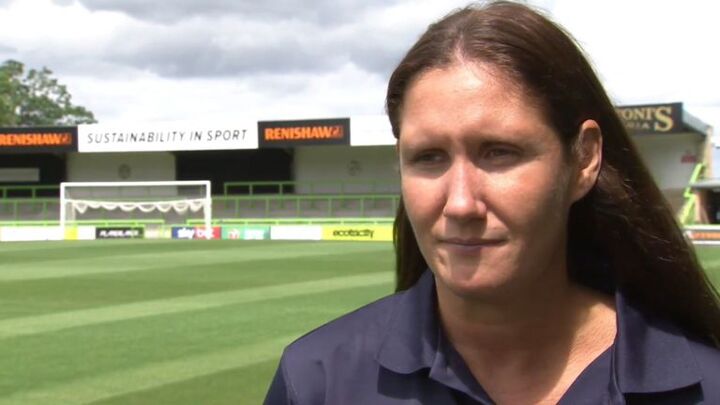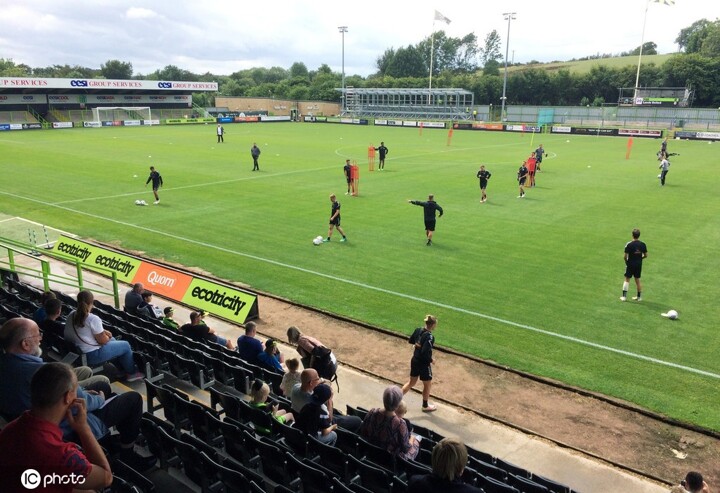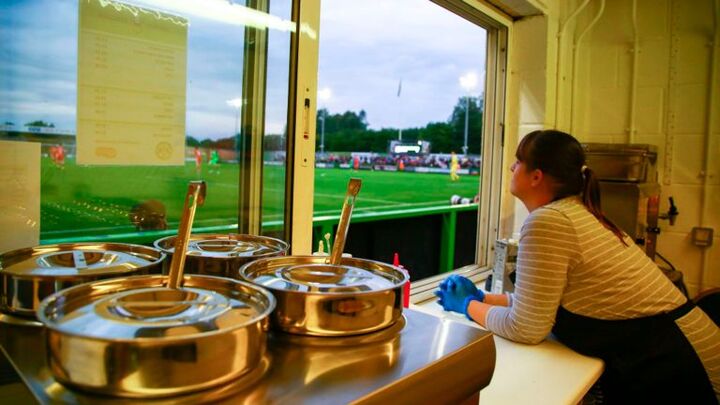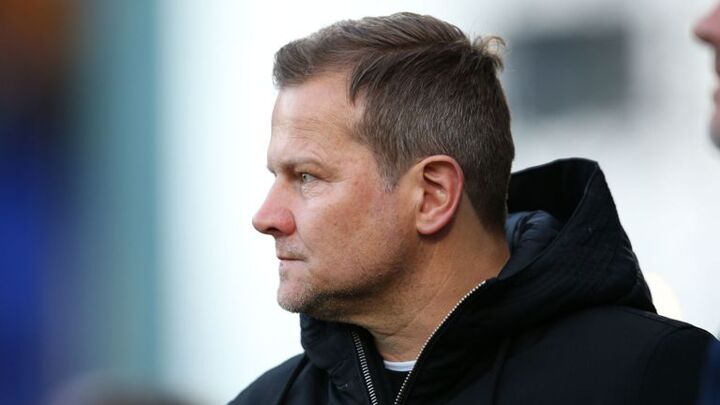The road leading up to Forest Green Rovers' New Lawn Stadium is called Another Way. It is a conspicuous reference to chairman Dale Vince's commitment to doing things differently.

You will have seen the headlines. The veggie burgers got people talking. The plans for a stadium built of wood caused a stir. Now Forest Green, this tiny club based in the Cotswolds, is working with the United Nations on a global programme to engage sports in the fight against climate change. Punching above their weight? That hardly does it justice.
But there was another meaningful way in which Vince and his club led the way in instituting change this summer. They appointed Hannah Dingley as their new academy manager. Dingley is the first woman ever to hold this position at a club in the Football League.
"I can honestly say it wasn't an issue for us in the recruitment," Vince tells Sky Sports.
"So we didn't see it as something to celebrate. It was a complete non-issue. We certainly didn't set out to make a statement, we just looked at the candidates. Hannah was the outstanding candidate. It was only after we had chosen her, someone said that she was the first appointed to that role. It tells you something about football doesn't it?"

It tells you something about Forest Green too.
As Dingley looks out over the pitch of a team that currently sits top of the League Two table, there is a drink in hand - no plastic cups, of course - and a sense of pride at being part of all this. But there is also some frustration that what happens here is not replicated elsewhere.
"I applied for other jobs and didn't even get past the door," Dingley tells Sky Sports. "With a Pro Licence, having been a head of coaching, with all the academic background, I couldn't get an interview. You do wonder why that is. Every club should have an equitable employment policy but I don't think every club does. That is a disappointing state of affairs.
"You do wonder why other clubs aren't doing it but this club is brilliant. It is very ethical. The sustainability. The veganism. But it is deeper than that. The club has strong principles and that all filters down from Dale. Appointing the first female academy manager comes from the same place. It is just about doing things equitably, the way they should be done."

Dingley's commitment to coaching is not in doubt. During her playing days, she took to the field on a Saturday and then coached in non-League on a Sunday. She taught on a university degree course on sports coaching and later became head of coaching at Burton Albion. There have been supporters but there has also been prejudice. It has been a challenge.
"It would be nice to say it was easy, but I wouldn't say it was difficult either because when it is something you really want to do then you won't let that get in your way. I never went on a female-only course. That was one of my bugbears. I am as capable as any other coach so I want to do the same courses as everyone else and pass it on merit if I am good enough.
"There have been bumps in the road. Ups and downs. It was harder when I was younger. I was aware that I stood out because I was different. I started my A Licence when I was 21. I was too young. I did not have the experience. I thought I could just fly through the courses, finish one and start the other. I hit a brick wall because I found out it was not that easy.
"The first time I did it I failed. I was nowhere near the level to pass it. I was stood in the middle of the pitch seeing players running around everywhere and thinking that I had to be saying something but not knowing quite what to say. You have to get that experience.

"I needed to allow some time to learn by doing. I had to go away and spend the time doing the hours in non-League, doing everything I needed to do to get that experience and pass it second time around. It's not been a linear path but I would rather have that than be given a qualification just because they had to get the number of female coaches up.
"You hope there are not the barriers that there were when I started too. I wasn't the only woman on my Pro Licence course - there were two of us. There are now female coaches in academies. Maybe not as many as there could be but they are there. So there are opportunities out there and the women's game is also growing. There are pathways now."
It is early days in this new job. "I keep saying I have only been here a couple of months and it will settle down," says Dingley. "Then the next month comes and it still hasn't settled down." But it would be wrong to say that it is too soon to see the results of her work. Vince already speaks enthusiastically about the transformation that he has seen.
"I am really pleased with the academy, particularly given the changes that we have seen under Hannah," he explains. "It's the cohesion that we now have between the academy and the first team. It's the communication, the collaboration, the partnership. We didn't have that before. They are very joined-up, working well together as a team."

Dingley credits Mark Cooper for much of that. The Forest Green boss has not only guided the club to the top of the table playing a brand of football rarely seen in the fourth tier, he has done so with the youngest team in the league. The commitment to youth development is non-negotiable. Sustainability at Forest Green extends to the selection policy too.
"The manager here is outstanding," says Dingley. "The first couple of weeks I was here, he came and coached the kids and opened the door to staff to watch sessions. It is a very open environment. He actually wants that engagement from the academy. He will actually look at them. He turns up on weekend mornings without even telling us.
"He knows the boys who suit his way of playing. We aren't having to push them. He is coming and saying he wants them in training with them next week. That is a bit of a rarity in academies and it shows that we are all on the same page which is important because the first team have a distinctive style of play that's very different to the norm in League Two.
"The manager has strong principles. He wants to play a certain style and he is not going to suddenly start shelling it because that's not his way. We play out in a quite unique way in terms of clearing space and the goalkeeper being key to it so everyone must be comfortable on the ball. There are certain patterns of play that reflect what the academy do.
"That's really good for me as an academy manager because it is so distinct that it makes it very easy to understand what we need to replicate. When the kids see that alignment it is exciting for them too because they can see that the equivalent first-team player is doing exactly what he is being asked to do in his training sessions."

That pathway from academy to first team was made clear last month when 16-year-old Vaughn Covil played the full 90 minutes before scoring in a penalty shootout win over Coventry in the EFL Trophy. Dingley notes how the achievement reverberated around the academy as others became alive to the possibilities. For Vince, it was particularly satisfying.
"There were 20 of his family here and they were super excited," he says with a smile. "That debut is a product of this close collaboration between academy and first team. You need a relationship of trust to make that happen and we have that now."
It also highlights the competitive advantage that Forest Green enjoy thanks to Cooper's commitment to his style of play. It is likely that Covil would not be at the club otherwise.
"Vaughn is a great example of that," Dingley explains. "He came to us from Southampton. He was told that he wasn't going to get a scholarship there so he went to lots of other clubs. If he was really honest, this was probably one of his last options. But he had the opportunity under this manager to play exactly the same way as he did at Southampton.
"Without being derogatory, if this was typical League Two football and the ball was going over his head all the time then it would not be for him. But because of the way we play out, and because of his education at Southampton, it does help attract players."

There are 120 boys in Forest Green's academy. Relationships with clubs such as Southampton, Bristol City, Swansea and Cardiff are helping to improve the talent pool and the local community are beginning to appreciate what is on their doorstep too.
"Our first challenge is building our reputation in the area," says Dingley. "This is only our third season in the Football League and only our second year as a category three academy so we have to change the mindsets of the local community. We offer free tickets to the youngsters. We have to be a bit creative because we haven't got that financial resource.
"A large part of it is building relationships. Letting people know we are here and this is somewhere boys will be looked after and have opportunity. There are clubs all around the country with fantastic programmes but the boys don't get an opportunity at the end of it. We have a manager here who genuinely wants to play the young players."
The hope is that those young players will be getting their opportunities in League One next season. This is not a club that's afraid to discuss the possibility. Far from it. There are three stars on the shirt - one has been filled in to mark the promotion to League Two but two remain before the goal of establishing Forest Green in the Championship has been achieved.

"We always talk about it," says Vince. "I think the football in League One will suit us better. More football, less of the physical stuff. I think we are ready. It will take us a couple of years to be good enough to get into the Championship but that is where we want to be."
Vince also wants his new stadium and training complex - a 100 acre Eco Park just off junction 13 of the M5. There is an impressive model in the foyer of the current stadium but planning permission was refused in July. Vince remains optimistic. An appeal is being launched and a public enquiry meeting has been set for February of next year.
The sense is that Forest Green are making progress and the new Eco Park would transform what is possible. For now, the younger boys train at Cirencester where there is a 3G pitch, the other academy players are at the stadium and the first team are at Stanley Park in Chippenham. It's not ideal but whatever the location, it's the people that make it special.
"I coach the U18s and then I go and watch the young ones at night," says Dingley. "The U16s and U18s play on a Saturday and the U9s to U15s play on a Sunday. I try to see both. It's because I love it. I wouldn't do it if I didn't love it and there is loads more that we can do.
"There are category three clubs like Luton and Exeter producing huge numbers of players. We want Forest Green to do that. My only aspiration is to make this academy outstanding."
Another Way? It feels a lot like the right way.
